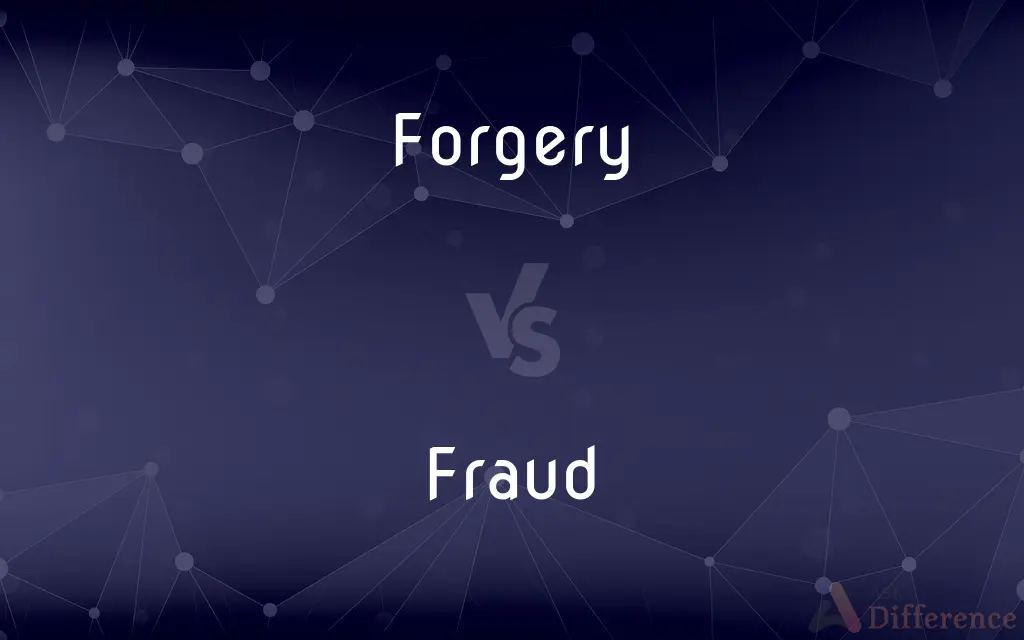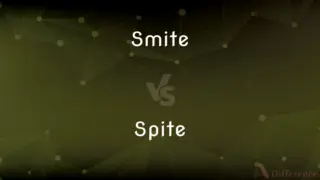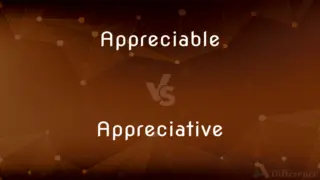Forgery vs. Fraud — What's the Difference?
By Fiza Rafique & Maham Liaqat — Updated on March 10, 2024
Forgery involves the creation of a fake document, signature, or art piece, while fraud is a broader term that includes deceitful practices for personal gain.

Difference Between Forgery and Fraud
Table of Contents
ADVERTISEMENT
Key Differences
Forgery is a specific act of fraud that entails making, altering, or presenting a false document, artwork, or signature with the intent to deceive. It often focuses on the creation of counterfeit items that appear genuine. Fraud, on the other hand, encompasses a wider range of deceitful activities aimed at achieving unlawful gain, which can include, but is not limited to, forgery.
While forgery is primarily concerned with the authenticity of physical items or documents, fraud can involve various deceptive practices, such as identity theft, investment scams, and insurance fraud, which may or may not include forged documents. In essence, forgery can be seen as a tool or method used in committing fraud.
Legal consequences for forgery are typically related to the creation or alteration of documents or items, with penalties based on the severity and intent of the act. Fraud charges, however, can vary widely depending on the type of fraud, the amount of financial damage inflicted, and the jurisdiction's specific laws.
In the context of legal proceedings, proving forgery usually involves demonstrating that the item in question is not what it purports to be. In contrast, proving fraud requires showing that deceitful acts were intentionally performed to secure an unjust advantage or to cause harm to another party.
Comparison Chart
Definition
The act of creating, altering, or imitating objects or documents.
A broader category of deceitful practices aimed at personal or financial gain.
ADVERTISEMENT
Scope
Typically involves documents, signatures, or art.
Encompasses a wide range of deceptive activities.
Intent
To deceive others by making them believe the forgery is genuine.
To deceive or trick someone for personal or financial gain.
Legal Focus
On the authenticity of physical items or documents.
On the deceitful act and its impact.
Examples
Falsified signatures, counterfeit currency, fake artworks.
Identity theft, investment scams, insurance fraud, including acts of forgery.
Compare with Definitions
Forgery
Creating a fake signature on a document.
The contract was voided due to a forged signature.
Fraud
Deceiving someone to gain unauthorized access to funds.
The email scam was a clear case of online fraud.
Forgery
Counterfeiting currency or financial instruments.
He was arrested for forging banknotes.
Fraud
Running investment schemes promising high returns with no risk.
The Ponzi scheme defrauded investors of millions.
Forgery
Replicating a piece of art and passing it off as original.
The gallery unknowingly displayed a forged painting.
Fraud
Using someone else's identity for financial transactions.
Identity fraud was committed to take out loans.
Forgery
Altering a document's details without authorization.
The dates on the report were forged to conceal the delay.
Fraud
Misrepresenting information to obtain insurance benefits.
She committed insurance fraud by exaggerating the claim.
Forgery
Imitating official documents for illegal purposes.
Forged passports were used to cross the border.
Fraud
Misleading consumers with false advertising.
The company's claims about the product were fraudulent.
Forgery
Forgery is a white-collar crime that generally refers to the false making or material alteration of a legal instrument with the specific intent to defraud anyone (other than themself). Tampering with a certain legal instrument may be forbidden by law in some jurisdictions but such an offense is not related to forgery unless the tampered legal instrument was actually used in the course of the crime to defraud another person or entity.
Fraud
Intentional deception resulting in injury to another person
Forgery
The act of forging something, especially the unlawful act of counterfeiting a document or object for the purposes of fraud or deception.
Fraud
In law, fraud is intentional deception to secure unfair or unlawful gain, or to deprive a victim of a legal right. Fraud can violate civil law (e.g., a fraud victim may sue the fraud perpetrator to avoid the fraud or recover monetary compensation) or criminal law (e.g., a fraud perpetrator may be prosecuted and imprisoned by governmental authorities), or it may cause no loss of money, property, or legal right but still be an element of another civil or criminal wrong.
Forgery
Something that has been forged, especially a document that has been copied or remade to look like the original.
Fraud
A deception practiced in order to induce another to give up possession of property or surrender a right.
Forgery
The act of forging metal into shape.
The forgery of horseshoes
Fraud
A piece of trickery; a trick.
Forgery
The act of forging, fabricating, or producing falsely; especially the crime of fraudulently making or altering a writing or signature purporting to be made by another, the false making or material alteration of or addition to a written instrument for the purpose of deceit and fraud.
The forgery of a bond
Fraud
One that defrauds; a cheat.
Forgery
That which is forged, fabricated, falsely devised or counterfeited.
Fraud
One who assumes a false pose; an impostor.
Forgery
(archaic) An invention, creation.
Fraud
(law) The crime of stealing or otherwise illegally obtaining money by use of deception tactics.
Forgery
The act of forging metal into shape.
Useless the forgeryOf brazen shield and spear.
Fraud
Any act of deception carried out for the purpose of unfair, undeserved and/or unlawful gain.
Forgery
The act of forging, fabricating, or producing falsely; esp., the crime of fraudulently making or altering a writing or signature purporting to be made by another; the false making or material alteration of or addition to a written instrument for the purpose of deceit and fraud; as, the forgery of a bond.
Fraud
The assumption of a false identity to such deceptive end.
Forgery
That which is forged, fabricated, falsely devised, or counterfeited.
These are the forgeries of jealously.
The writings going under the name of Aristobulus were a forgery of the second century.
Fraud
A person who performs any such trick.
Forgery
A copy that is represented as the original
Fraud
(obsolete) A trap or snare.
Forgery
Criminal falsification by making or altering an instrument with intent to defraud
Fraud
(obsolete) To defraud
Fraud
Deception deliberately practiced with a view to gaining an unlawful or unfair advantage; artifice by which the right or interest of another is injured; injurious stratagem; deceit; trick.
If success a lover's toil attends,Few ask, if fraud or force attained his ends.
Fraud
An intentional perversion of truth for the purpose of obtaining some valuable thing or promise from another.
Fraud
A trap or snare.
To draw the proud King Ahab into fraud.
Fraud
A person who makes deceitful pretenses
Fraud
Something intended to deceive; deliberate trickery intended to gain an advantage
Common Curiosities
How is fraud detected and proven in court?
Fraud is detected through investigations and is proven by demonstrating the deceptive act, the intention behind it, and the resultant harm or gain.
What are common penalties for forgery?
Penalties can include fines, imprisonment, and restitution, depending on the jurisdiction and severity of the offense.
How do legal systems differentiate between forgery and fraud?
Legal systems examine the nature of the deceptive act, its execution, and its intent to categorize it as forgery or another type of fraud.
Can fraud occur without forgery?
Absolutely, fraud can take many forms that do not necessarily involve forgery, such as verbal lies or deceptive acts.
Is all forgery considered fraud?
Yes, forgery is a form of fraud, specifically involving the creation of false documents or items.
Are digital documents and signatures subject to forgery?
Yes, digital documents and electronic signatures can also be forged, leading to cyber fraud.
Can forgery be accidental?
Forgery involves intent to deceive, so accidental misrepresentations are not considered forgery but may be considered negligence or error.
Can a forged artwork be considered fraud if it's not sold?
If the artwork is presented as genuine with the intent to deceive, it can still be considered fraud, regardless of a sale.
How do consumer protection laws relate to fraud?
These laws aim to protect consumers from fraudulent practices by ensuring fair trade, accurate information, and recourse for victims.
What role do regulatory agencies play in combating fraud?
Regulatory agencies enforce laws, investigate fraud cases, and implement measures to prevent fraudulent activities in various sectors.
Share Your Discovery

Previous Comparison
Smite vs. Spite
Next Comparison
Appreciable vs. AppreciativeAuthor Spotlight
Written by
Fiza RafiqueFiza Rafique is a skilled content writer at AskDifference.com, where she meticulously refines and enhances written pieces. Drawing from her vast editorial expertise, Fiza ensures clarity, accuracy, and precision in every article. Passionate about language, she continually seeks to elevate the quality of content for readers worldwide.
Co-written by
Maham Liaqat














































